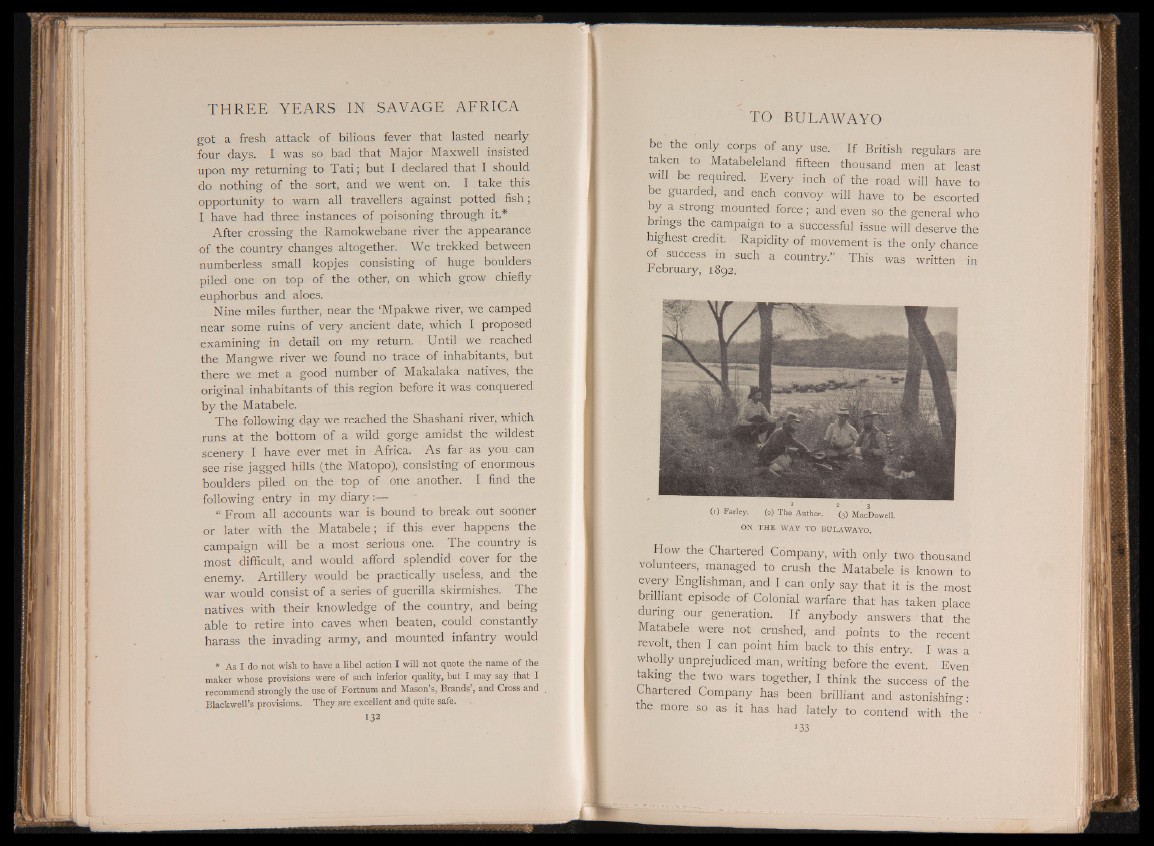
got a fresh attack of bilious fever that lasted nearly
four days. I was so bad that Major Maxwell insisted
upon my returning to Tati; but I declared that I should
do nothing of the sort, and we went on. I Take this
opportunity to warn all travellers against potted fish;
I have had three instances of poisoning through it.*
After crossing the Ramokwebane river the appearance
of the country changes altogether. We trekked between
numberless small kopjes consisting of huge boulders
piled one on top of the other, on which grow chiefly
euphorbus and aloes.
Nine miles further, near the ‘Mpakwe river, we camped
near some ruins of very ancient date, which I proposed
examining in detail on my return. Until we reached
the Mangwe river we found no trace of inhabitants, but
there we met a good number of Makalaka natives, the
original inhabitants of this region before it was conquered
by the Matabele.
The following day we reached the Shashani river, which
runs at the bottom of a wild gorge amidst the wildest
scenery I have ever met in Africa. As far as you can
see rise jagged hills (the Matopo), consisting of enormous
boulders piled on the top of one another. I find the
following entry in my diary :—
“ From all accounts war is bound to break- out sooner
or later with the Matabele; if this ever happens the
campaign will be a most serious one. The country is
most difficult, and would afford splendid cover for the
enemy. Artillery would be practically useless, and the
war would consist of a series of guerilla skirmishes. The
natives with their knowledge of the country, and being
able to retire into caves when beaten, could constantly
harass the invading army, and mounted infantry would
* As I do not wish to have a libel action I will not quote the name of the
maker whose provisions were of such inferior quality, but I may say that I
recommend strongly the use of Fortnum and Mason’s, Brands’, and Cross and
Blackwell’s provisions. They are excellent and quite safe.
132
be the only corps of any use. I f British regulars are
taken to Matabeleland fifteen thousand men at least
will be required. Every inch of the road will have to
be guarded, and each convoy will have to be escorted
by a strong mounted force; and even so the general who
brings the campaign to a successful issue will deserve the
highest credit. Rapidity of movement is the only chance
of success in such a country.” This was written in
February, 1892.
I 2 3
(1) Farley. (2) The Author. (3) MacDowell.
ON TH E WAY TO BULAWAYO.
How the Chartered Company, with only two thousand
volunteers, managed to crush the Matabele is known to
every Englishman, and I can only say that it is the most
brilliant episode of Colonial warfare that has taken place
during our generation. If anybody answers that the
Matabele were not crushed, and points to the recent
revolt, then I can point him back to this entry. I was a
wholly unprejudiced man, writing before the event. Even
taking the two wars together, I think the success of the
Chartered Company has been brilliant and astonishing:
the more so as it has had lately to contend with the
133